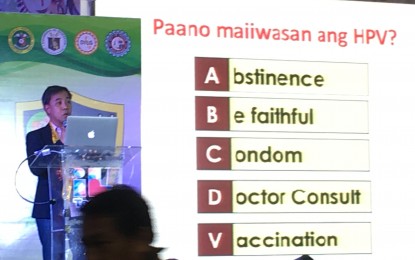
Dr. Erwin de Mesa, president of Philippine Infectious Disease Society for Obstetrics and Gynecology, says vaccines against human papilloma virus are proven safe. He added they have recorded upto 90 percent effectiveness against cervical cancer and 99 percent protection against formation of warts in the genital area. (PNA photo by Ma. Teresa Montemayor)
MANILA -- Vaccinating nine-year-old girls against human papillomavirus (HPV) could curb the increasing cases of cervical cancer nationwide, a health expert said on Thursday.
Dr. Erwin de Mesa, president of Philippine Infectious Disease Society for Obstetrics and Gynecology, said 99 percent of cervical cancer cases are caused by HPV.
"In the Philippines, 7,190 new cases of cervical cancer are recorded each year and 4,088 Filipinas die because of it every year. This means 11 Filipinas die each day and it is the second leading cause of death among women due to cancer, next to breast cancer," de Mesa said during the National Capital Region Parent's Forum in Taguig City.
Citing that 30 to 40 types of HPV affect the female and male genitals, de Mesa said sex with multiple partners is the most common mode of transmission of the virus.
"It is characterized by warts in the genital area and buttocks and with its more than 100 types, it can cause vulvar cancer, vaginal cancer, anal cancer, mouth, and lung cancer," he said, adding that HPV infection can be detected through Pap smear, visual inspection with acetic acid and HPV DNA test.
De Mesa said abstinence from sex, being faithful to your partner, correct condom use, consultation with the doctor and vaccination are some of the ways to prevent contracting HPV.
"There should be mutual monogamy between you and your partner. Nakatutulong din ang tamang paggamit ng condom. Dapat bago ang condom at nasa tamang (proper use of condom also helps. Your condom must be new and in the right) temperature for storage. But don't assume that condom will keep you from contacting HPV because it can be spread through skin to skin contact with no symptoms at all," he added.
De Mesa said vaccination against the virus "before they engage in sexual intercourse is the most effective means to prevent HPV".
"Mayroon pong mga pag-aaral na ang mga kabataan (There are studies saying the young) at 14 years old already have exposure to HPV. To get the maximum protection of the vaccine, it must be administered twice within six months to boys and girls aged 9 to 14 years old," he said.
To strengthen the immune system of students against HPV, de Mesa said the Department of Health included the HPV vaccine administration in their school-based immunization program.
"Kasama ang Department of Education at Department of the Interior and Local Government, ibinibigay ang bakuna sa mga batang babae na 9 to 14 years old nang libre. Sa ngayon po ang programa ay limitado lamang sa mga kabataang babae pero maaari din pabakunahan laban sa HPV ang mga batang kalalakihan (With Department of Education and Department of the Interior and Local Government, this vaccine is given to girls aged 9 to 14 years old for free. Now, the program is limited to girls but boys can also be vaccinated against HPV)," he said. (PNA)
